Dealing with a landlord dispute, a home purchase, or an eviction can be stressful—but understanding your rights under Texas law can make all the difference. Whether you're a landlord, tenant, buyer, or seller, a real estate contract in Texas is a legally binding agreement that lays out the rules for buying, selling, or leasing a property. The most important thing to know upfront? To be enforceable for most real estate transactions, it must be in writing.
Getting a handle on the key parts of that document is your first and best defense in protecting your rights.
Navigating Your Texas Real Estate Contract

Let's be honest: the dense legal language packed into most property agreements can create more questions than answers. It’s easy to get lost in the jargon and end up feeling unsure about your responsibilities or your rights. This guide is here to cut through that confusion and shine a light on the essential parts of any Texas property agreement.
Our goal is to explain the critical clauses that actually protect you. We want to give you practical, real-world insights so you can review your contract with confidence. Think of this as your roadmap to managing property agreements under Texas law, empowering you to protect your interests and sidestep common disputes.
Why Your Contract Matters More Than Ever
The Texas real estate market never sleeps, which makes a rock-solid understanding of contracts non-negotiable for everyone involved. Market trends have a direct impact on negotiations and the kind of terms you’ll see in an agreement.
For instance, Texas recently saw a 3.9% increase in home sales volume over the previous year, proving the market's resilience. At the same time, the median home price landed at $224,200, a slight dip that shows how borrowing costs are shaping today's transactions.
This fast-moving environment is exactly why every clause, every deadline, and every disclosure in your contract carries so much weight. A well-written contract is your strongest shield in a dispute. A poorly understood one? That can quickly become a serious liability.
To get started on the right foot, it’s crucial to get a firm grasp on the fundamentals by understanding what a real estate contract entails in Dallas. Whether you’re a landlord trying to secure your investment or a tenant protecting your home, knowledge is your most powerful asset.
The Foundation of a Valid Texas Contract
For any real estate contract in Texas to hold up in court, it has to be built on a solid legal foundation. Think of it like building a house—if you skimp on the foundation, the whole thing can come crashing down. In legal terms, a poorly constructed contract is unenforceable, leaving you completely unprotected.
Fortunately, the core requirements aren't a secret code. They’re straightforward principles designed to make sure every agreement is clear, fair, and legally sound for everyone involved. Let's walk through these non-negotiable elements one by one.
Offer and Acceptance: A Meeting of the Minds
It all starts here. A contract can't exist without a clear offer from one person and an unconditional acceptance from the other. This isn't just a casual chat; it's a "meeting of the minds" where both sides agree to the exact same deal.
Real-World Scenario: Imagine a landlord offers to rent you a one-bedroom apartment for $1,500 a month on a one-year lease. To form a valid contract, you have to accept that specific offer. If you say, "I'll take it for $1,400," you haven't accepted anything. Instead, you've just made a counteroffer, which kills the original offer. The deal is only sealed when both parties say "yes" to identical terms.
Consideration: The Exchange of Value
Every legitimate contract needs consideration—a legal term for the "something of value" that each party gives up. It’s the "this for that" component that makes the deal a two-way street.
In a lease, the consideration is pretty obvious:
- The tenant’s consideration is your promise to pay rent every month.
- The landlord’s consideration is their promise to provide a safe, habitable place to live.
Without this mutual exchange, all you have is a one-sided promise, not a contract that a judge will enforce.
Legally Competent Parties and Lawful Purpose
A contract is only valid if the people signing it are legally able to make that commitment. In Texas, this generally means they must be 18 or older and of sound mind. A lease signed by a minor or someone deemed mentally incapacitated by a court can usually be voided.
Just as important, the contract's purpose must be legal. You can't have an enforceable contract to do something illegal. An agreement to lease a property for the known purpose of running an illicit business, for instance, is void from the get-go because it's based on an unlawful objective.
It’s a simple but powerful rule: Texas courts will not enforce a contract that requires someone to break the law. The entire purpose of the agreement must be above board.
What the Texas Property Code Says About the Statute of Frauds
This is arguably the most critical rule for Texas real estate contracts: the Statute of Frauds. This state law demands that any agreement for the sale of property or for a lease lasting longer than one year must be in writing and signed by the party against whom it's being enforced.
While you might hear about verbal agreements being binding, that almost never flies in real estate. This writing requirement is there for a reason—to prevent fraud, arguments, and fuzzy memories about what was agreed upon. If it's not on paper and signed, from a legal standpoint, it's like the promise was never made. To see just how risky relying on a handshake can be, check out our guide on why verbal contracts in Texas are a minefield, especially with property.
Here's a quick summary of what every enforceable real estate contract in Texas needs.
Core Elements of an Enforceable Texas Real Estate Contract
| Element | What It Means for You | Real-World Example |
|---|---|---|
| Offer and Acceptance | Both parties must agree on the exact same terms without any changes. | A landlord offers a lease for $1,800/month; the tenant signs the lease, accepting those specific terms. |
| Consideration | Each side must give something of value to the other. | The tenant provides rent money, and the landlord provides the right to occupy the apartment. |
| Legal Capacity | All parties must be legally competent (e.g., of legal age and sound mind). | Both the tenant and the landlord are over 18 and understand the agreement they are signing. |
| Lawful Purpose | The contract's objective must not violate any laws. | The lease is for a residential apartment, not for operating an illegal gambling den. |
| In Writing (Statute of Frauds) | For leases over one year, the agreement must be written and signed. | A 24-month lease is printed out and physically or digitally signed by both the landlord and the tenant. |
Think of these elements as a checklist. If your contract is missing even one of these components, you could be left with an agreement that isn't worth the paper it's printed on.
Critical Clauses You Cannot Afford to Miss
Once you’ve got the basic framework of a contract down, the real work begins. The fine print—the specific clauses tucked away inside the agreement—is where your rights are truly defined and your interests are protected. Think of it like a blueprint for your property deal. These clauses are the critical measurements and instructions that decide whether the whole thing stands strong or comes crashing down later.
Skipping over these details is a gamble you just can't afford to take. One poorly worded or missing clause can turn a straightforward agreement into a nightmare of stress and legal fees. It doesn’t matter if you’re a landlord, tenant, buyer, or seller—nailing these provisions is non-negotiable for protecting yourself in any real estate contracts in Texas.
Key Clauses for Buyers and Sellers
When you’re buying or selling a home, a few key clauses are going to manage the money, the timeline, and the "what-ifs." These are almost always the most heavily negotiated parts of the deal, so they need your full attention.
- Earnest Money: This is your "good faith" deposit. It’s the cash a buyer puts down to show they’re serious. The contract has to spell out exactly how much, who holds it (usually a title company), and the exact conditions for getting it back or losing it to the seller.
- Option Period and Fee: This is a classic Texas feature. The option period gives the buyer a set number of days to get inspections done and back out for any reason at all. You literally "buy" this right with a non-refundable option fee. Your contract must clearly state how long this period lasts and how much the fee is—this is your get-out-of-jail-free card if you find something you don't like.
- Default Provisions: What happens if someone flakes? This clause lays out the consequences if the buyer or seller breaks the contract. It defines the remedies, which could be anything from the seller keeping the earnest money to the buyer suing to force the sale to go through.
The infographic below shows how these clauses fit into the bigger picture of a valid Texas contract.
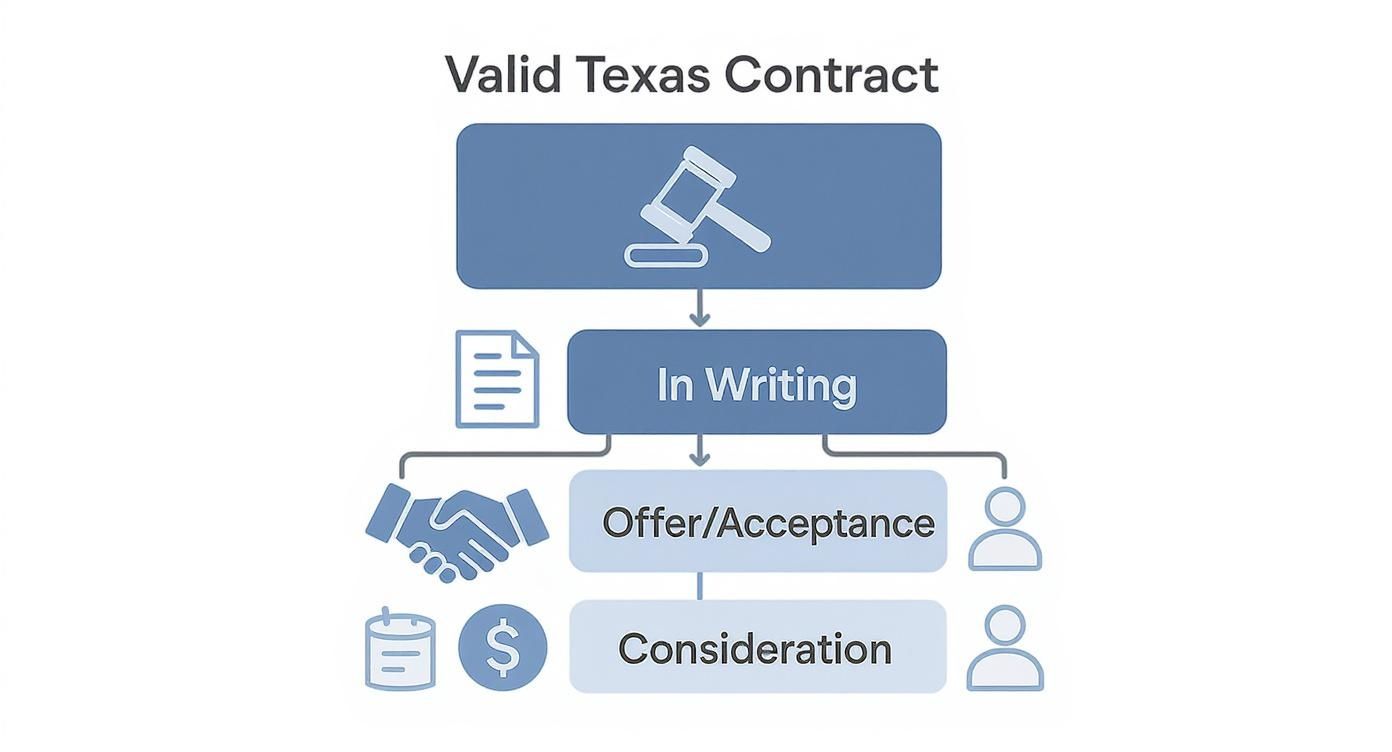
As you can see, before you can even argue about a specific clause, the entire agreement has to be legally sound—starting with the basics like being in writing and involving a clear exchange of value.
Must-Have Clauses for Landlords and Tenants
When it comes to leases, the make-or-break clauses are all about the daily rights and duties of living in and managing a property. Getting these right from the start is the key to avoiding headaches down the road.
Rent and Security Deposit Terms
Your lease needs to be brutally clear about the money. It should state the exact rent amount, the due date (like the 1st of the month), and spell out any grace periods or late fees. Ambiguity here is just asking for a fight.
The security deposit clause is also a big one, and it's heavily regulated by the Texas Property Code. The lease has to detail the deposit amount and the rules for its return. Under Section 92.103, a landlord has just 30 days to refund a security deposit after a tenant moves out, as long as the tenant provided a forwarding address.
Repairs and Maintenance Duties
Repairs are probably the #1 source of landlord-tenant drama. Who fixes what? A solid lease draws a clear line in the sand. While landlords have a legal duty to keep the property habitable, the lease should outline the process for requesting repairs.
Real-World Scenario: A well-written clause will require you, as the tenant, to submit repair requests in writing and give the landlord a reasonable amount of time to handle them. This creates a paper trail and sets fair expectations for everyone involved, protecting your tenant rights.
Landlord's Right of Entry
Tenants have a right to "quiet enjoyment" of their home, but landlords occasionally need to get inside for inspections, repairs, or to show the property. Texas law demands the lease specify when and how a landlord can enter. This usually means giving "reasonable notice," which is often defined as 24 hours unless there's an emergency. This clause is all about protecting the tenant's privacy while respecting the landlord's rights.
Understanding how to structure these terms is crucial. Interestingly, you can find useful parallels in other types of legal documents; for instance, identifying the key clauses in data sharing agreements also involves ensuring every term is precise and serves a clear purpose.
Some contracts, like a lease-purchase, actually blend sale and rental agreements, which makes having crystal-clear clauses even more critical. You can learn more about how these hybrid deals are structured in our guide on what is a lease purchase contract.
It’s also worth noting that the financial stakes are higher than ever for Texas buyers. A recent report found that the typical downpayment for first-timers in Texas hit 8%—the highest since 1997—while repeat buyers put down an average of 19%. With so much more money on the line, protective clauses like the option period and earnest money provisions have become absolutely essential.
Understanding TREC Forms and Mandatory Disclosures
If you've ever dealt with real estate in Texas, you might have noticed something—many of the deals feel more predictable than in other states. That’s no accident. It's largely thanks to the Texas Real Estate Commission (TREC), which provides standardized forms for the vast majority of transactions.
This creates a consistent, reliable framework whether you're buying, selling, or leasing. It’s a huge advantage for everyone involved.
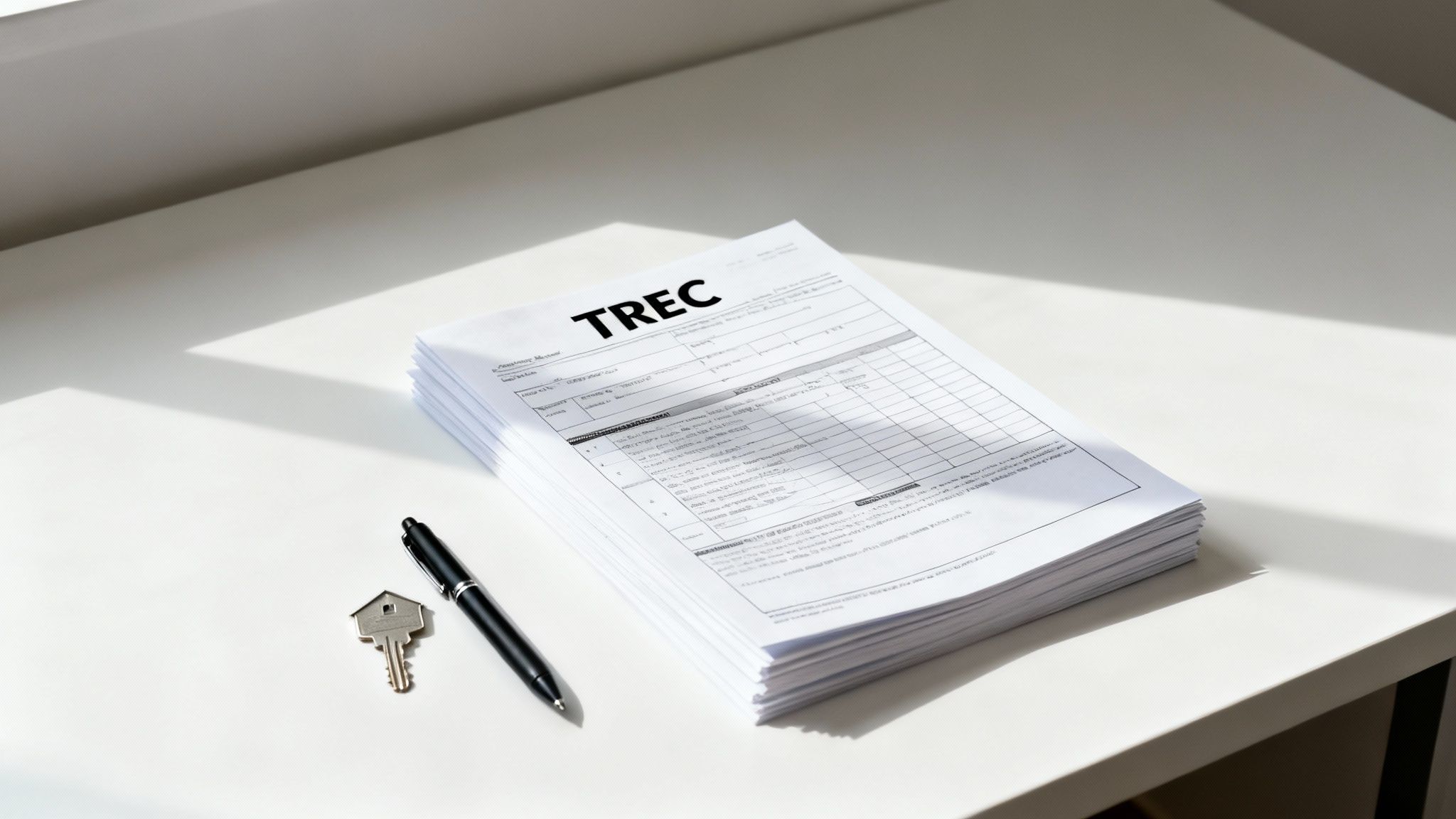
Think of TREC forms as the common language of Texas real estate. Legal experts draft them to be fair and balanced, making sure they cover all the critical parts of a deal. Using these forms dramatically cuts down on the risk of disputes caused by vague or one-sided contracts.
For most homebuyers, the most familiar document is the TREC One to Four Family Residential Contract (Resale). This is the gold standard for buying a typical single-family home. It walks both parties through every single step, from financing details to closing dates. Its widespread use is a huge reason the Texas market operates as smoothly as it does.
Why You Still Need a Pro
These contracts might be standardized, but they’re not simple. That's why Texas has such a robust workforce of real estate professionals who guide people through these documents every single day.
According to the Bureau of Labor Statistics, Texas is home to a staggering 23,810 real estate sales agents. Major hubs like Dallas-Fort Worth and Houston are packed with these pros, highlighting just how much demand there is for real expertise in navigating the fine print of real estate contracts in Texas. You can find more data on real estate professionals from the BLS.
The Seller’s Disclosure Notice: The Document You Can't Ignore
Beyond the main contract, one of the most important pieces of paper you'll ever see is the Seller's Disclosure Notice. This isn't just a friendly suggestion; it's a legal requirement under the Texas Property Code, Section 5.008. The law is crystal clear: sellers of single-unit residential properties must give buyers a form disclosing everything they know about the property's condition.
This notice is your first and best defense against ugly surprises after you get the keys. It forces the seller to go on the record about a whole host of potential issues.
What Are They Required to Tell You?
The form gets into the nitty-gritty, covering things like:
- Structural Problems: Any known issues with the foundation, roof, walls, or ceilings.
- Systems and Appliances: The condition of the plumbing, electrical, and HVAC systems, plus any appliances that come with the house.
- Environmental Hazards: Information on asbestos, lead-based paint, radon gas, or previous flooding.
- Property History: Past fires, termite damage, or major repairs that have been done.
The point of the Seller’s Disclosure is simple: honesty. It’s designed to give a buyer a fair, transparent look at what they’re really buying. It’s the best tool for preventing that sinking feeling of "buyer's remorse" when a hidden defect finally shows up.
What if the Seller Wasn’t Honest?
So, what happens if a seller lies or just "forgets" to mention a known problem? If you discover a major defect after the sale that wasn't disclosed, you may have legal options. The Texas Deceptive Trade Practices Act (DTPA) can hold sellers accountable for failing to disclose known issues.
If you suspect a seller was untruthful on their disclosure, your very first step should be to talk to a Texas landlord tenant lawyer. An attorney can review your case, help you figure out if you have a valid claim, and advise you on what to do next. That could mean seeking money for repairs or, in the most serious cases, even trying to reverse the sale. This legal backstop is why full and honest disclosure isn't just good practice—it's the law.
How to Resolve Common Contract Disputes
Even the most perfectly drafted real estate contracts in Texas can’t stop every single disagreement. When you're dealing with something as personal and important as a home, it’s easy for emotions to flare up and misunderstandings to happen.
The good news? Texas law actually provides a pretty clear roadmap for sorting these things out. Most of the time, these issues can be resolved without ever stepping foot in a courtroom. Your best defense is knowing your rights and the proper steps to take.
The Most Common Landlord-Tenant Conflicts
While every situation has its own unique wrinkles, a few types of disputes tend to show up time and time again in Texas landlord-tenant relationships. Getting a handle on the legal ground rules for each one is the first step toward finding a real solution.
Here are the top three issues we see most often:
- Early Lease Termination: The tenant needs to move out before the lease is over, or maybe the landlord wants to end the lease ahead of schedule.
- Failure to Make Repairs: A tenant reports a serious problem—like a busted AC unit in the middle of a Texas summer—but the landlord just isn't getting it done.
- Security Deposit Returns: The tenant moves out, but a fight breaks out over deductions from the security deposit, or the landlord simply misses the legal deadline to return it.
These aren't just matters of opinion; they are all directly addressed by the Texas Property Code, which spells out the duties and remedies for both landlords and tenants.
Step-by-Step: Resolving a Dispute
No matter which side of the argument you're on, your first move should almost always be a formal, written notice. Why? Because angry phone calls and heated conversations are easily forgotten, misremembered, or flat-out denied later. A written letter sent via certified mail creates a paper trail. It's undeniable proof that you made a good-faith effort to resolve the problem.
Here's a step-by-step approach to handling these issues:
- Give Written Notice: For instance, if you need a critical repair, Texas Property Code Section 92.056 requires you to give the landlord written notice of the issue. That letter is what officially triggers the landlord's legal duty to get to work on the repair. Without that written proof, it's much tougher to enforce your tenant rights down the road.
- Consider Mediation: Before you even start thinking about a lawsuit, you should give serious thought to mediation. This is a process where a neutral third party—the mediator—sits down with both of you to help you communicate and find a solution you can both agree on. It’s almost always faster, cheaper, and way less stressful than going to court. You can see how real estate mediation works and how it can save you a ton of time and money.
- Go to Court if Necessary: Sometimes, you do everything right and still can't find common ground. If your written notices are ignored and mediation isn't going to happen, your next stop might be the Justice of the Peace (JP) court. Under Texas Property Code Section 92.109, a tenant can sue a landlord in JP court if their security deposit was withheld in bad faith. Landlords also use JP courts to file for eviction. While going to court can feel overwhelming, a skilled eviction attorney can stand up for your interests and make sure the law is followed to the letter.
Pouring over the Texas Property Code might give you a decent grasp of your rights, but knowing your rights and actually enforcing them are two very different things. Some contract disputes are more than just a simple disagreement—they're legal minefields where one wrong step can cost you your home or your investment. An experienced attorney doesn't just know the law; they know the system, the judges, and the tactics the other side will use against you.
When You Absolutely Need a Lawyer
If you find yourself in any of the situations below, it’s time to stop guessing and get real legal advice from a Texas landlord-tenant lawyer. These aren't minor issues; they are serious legal threats.
You should call an attorney immediately if:
- You've received an eviction notice. This isn't a suggestion—it's the first step in a formal lawsuit. You need an expert to defend you and make sure the landlord is following the Texas Property Code to the letter. They often don't.
- The landlord or seller hid a major defect. Did you move in only to discover a cracked foundation, a history of flooding, or a serious mold problem they "forgot" to mention? That’s potential fraud, and you'll need a lawyer to help you demand accountability.
- The other party is breaking the contract. When a landlord won't make legally required repairs or a tenant skips out on the lease, causing thousands in damages, you need legal muscle to enforce the terms of the agreement and recover your losses.
- The contract seems unfair or confusing. Before you sign anything, let an attorney review it. They can spot hidden clauses and one-sided terms designed to take advantage of you, preventing a disaster before it happens.
A lease is a legally binding contract that controls your housing and your money. When that contract is breached, putting your stability on the line, getting an eviction attorney to review your case isn't an overreaction—it's a necessity.
The right legal guidance changes everything. The attorneys at The Law Office of Bryan Fagan, PLLC can break down your contract into plain English, explain your options, and fight for you in negotiations or in court. Don't let a contract dispute derail your life.
Frequently Asked Questions
When you're dealing with Texas real estate contracts, a few questions always seem to pop up. Let's tackle some of the most common ones that landlords, tenants, buyers, and sellers run into.
What Happens if We Only Have a Verbal Agreement?
Relying on a verbal agreement in real estate is a recipe for disaster. Texas has a law called the Statute of Frauds, which is crystal clear: any contract for the sale of property or a lease that lasts longer than one yearmust be in writing to have a fighting chance in court.
Sure, a verbal agreement for a short-term lease (under a year) might be technically binding. But proving what you both agreed to without a signed document is a nightmare waiting to happen, often leading to expensive and frustrating legal battles.
How Does the Option Period Work for a Home Buyer?
Think of the option period as a buyer's "get out of jail free" card. For a small, non-refundable "option fee" that goes directly to the seller, the buyer purchases a set amount of time—usually 7 to 10 days—to do their homework.
This is your window to get inspections, estimates, or anything else you need to feel confident. If you find something you don’t like about the property's condition, you can terminate the contract for any reason at all and get your earnest money back. It's your unrestricted right to walk away.
How to Legally Break a Lease in Texas?
Breaking a lease isn't as simple as just moving out. The first place to look is the lease agreement itself. Many contracts include a "buy-out" or "reletting" clause that spells out exactly what it will cost you to leave early.
If your lease doesn't offer a clear exit path, the Texas Property Code might. Certain situations, like family violence or military deployment, give tenants legal grounds for early termination. No matter the reason, the first official step is always giving your landlord formal written notice that you intend to vacate.
What Remedies Are Available if Someone Breaches the Contract?
When one side doesn't hold up their end of the deal, it's called a breach. What happens next depends on the contract and the situation.
The most common remedies include:
- Specific Performance: This is when a court forces the breaching party to do what they promised. For example, a judge could order a seller to go through with the sale of a home.
- Monetary Damages: The wronged party can sue for the financial losses they suffered because of the breach. A common example is a landlord suing a tenant for unpaid rent.
- Rescission: The contract is essentially ripped up. The deal is canceled, and both parties are put back in the position they were in before signing, which usually means returning any money that was paid.
A Texas landlord-tenant lawyer can look at your specific dispute and figure out which remedy gives you the best chance of success.
If you need help with an eviction, lease issue, or rental dispute, contact The Law Office of Bryan Fagan, PLLC for a free consultation today. https://texastenantlawyers.com

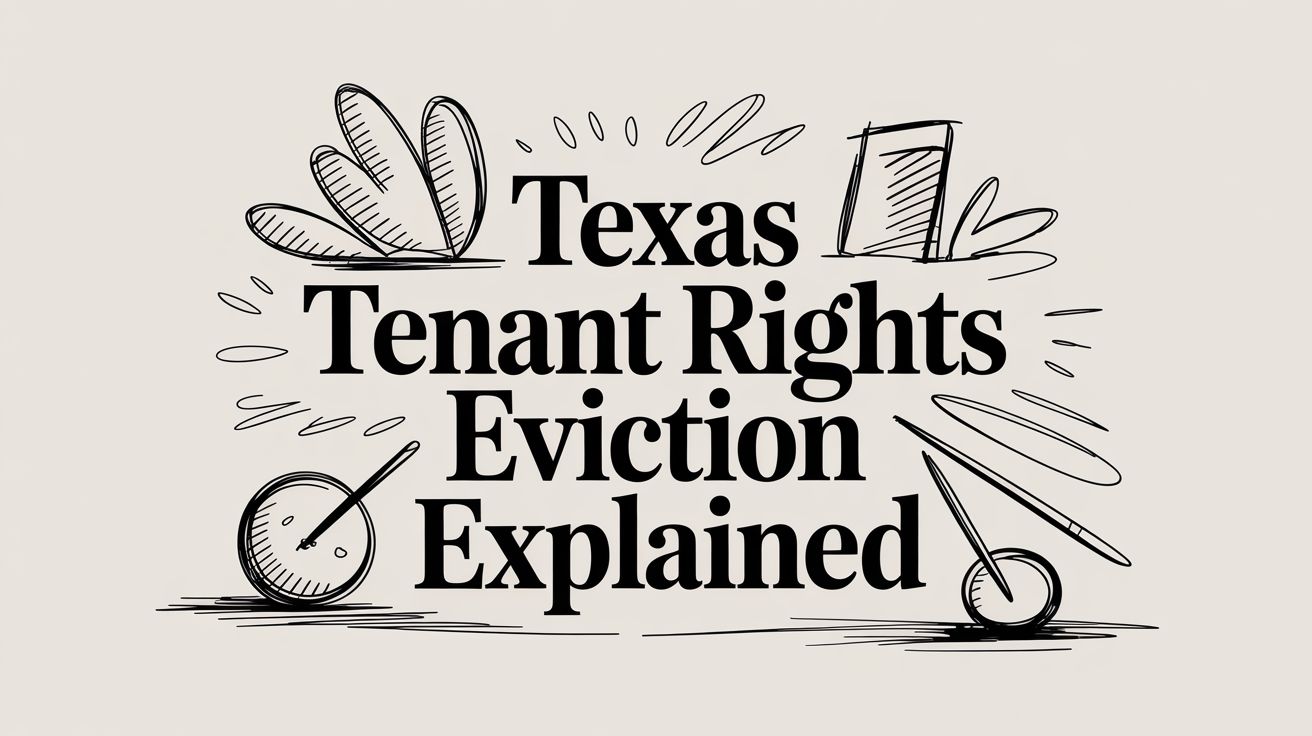
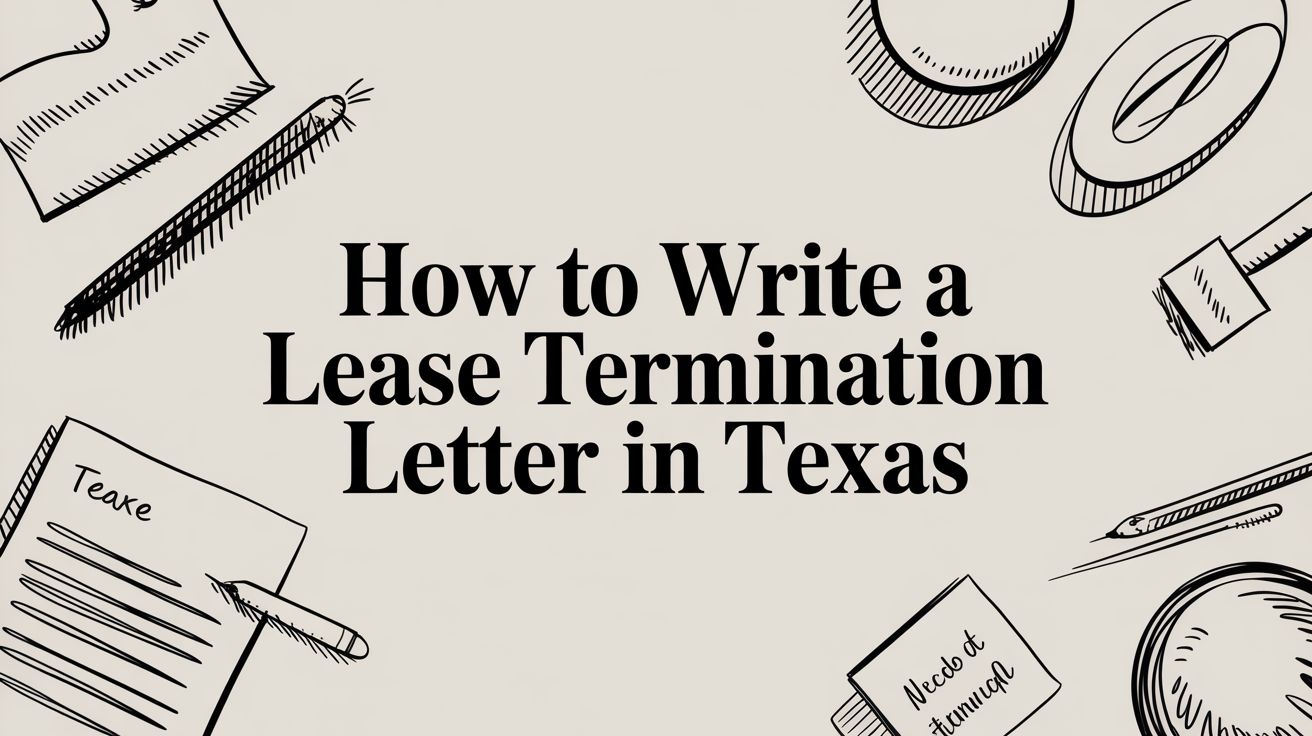
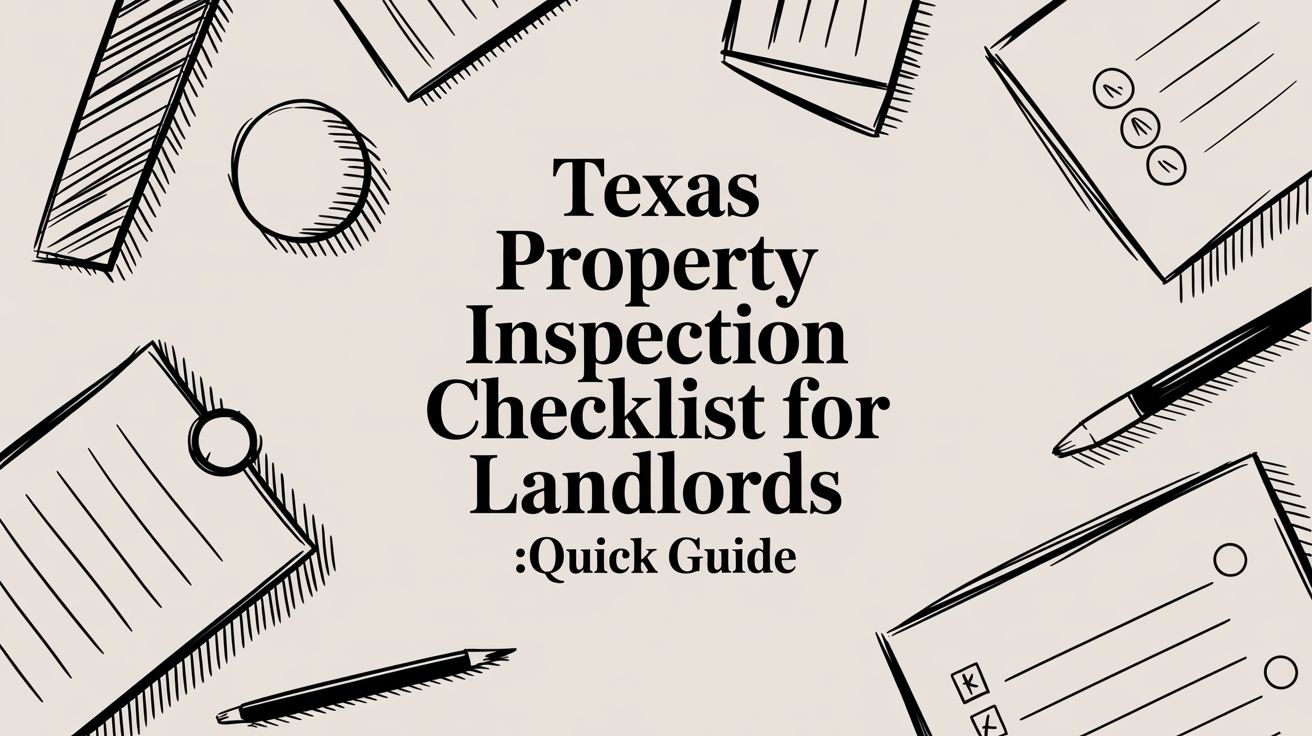
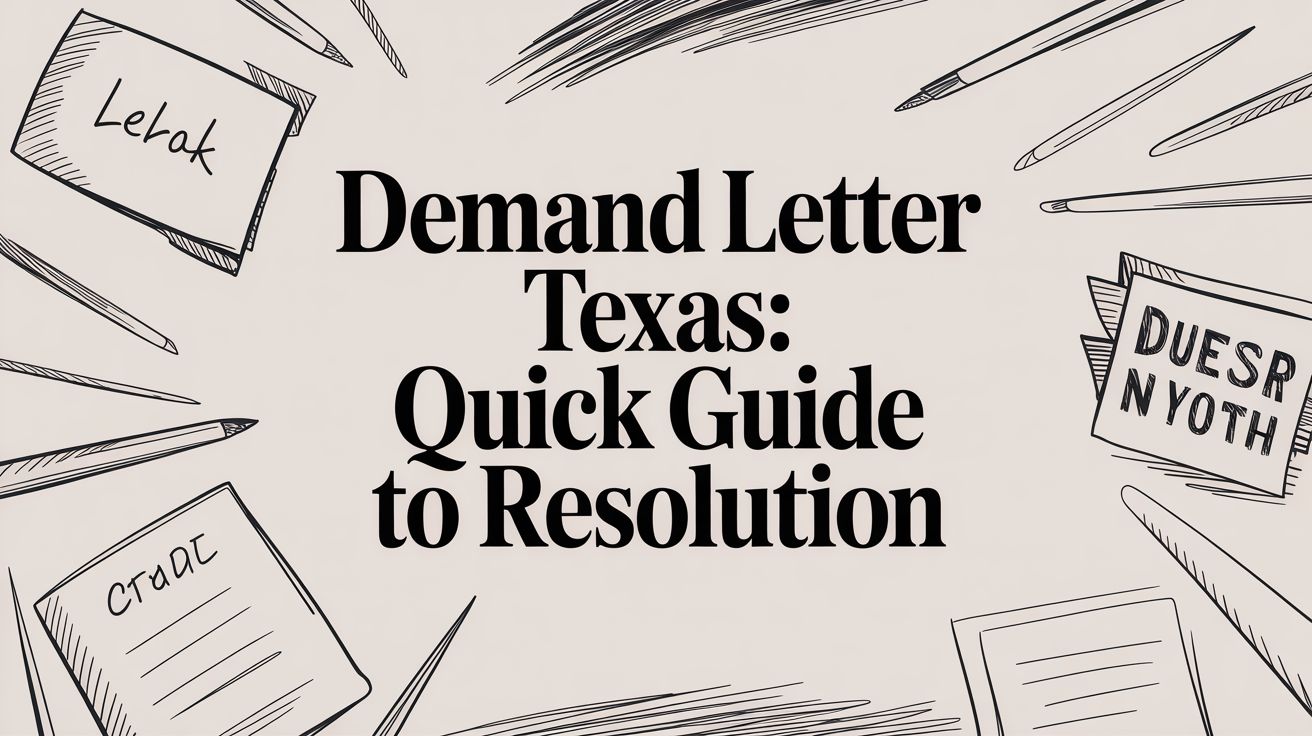
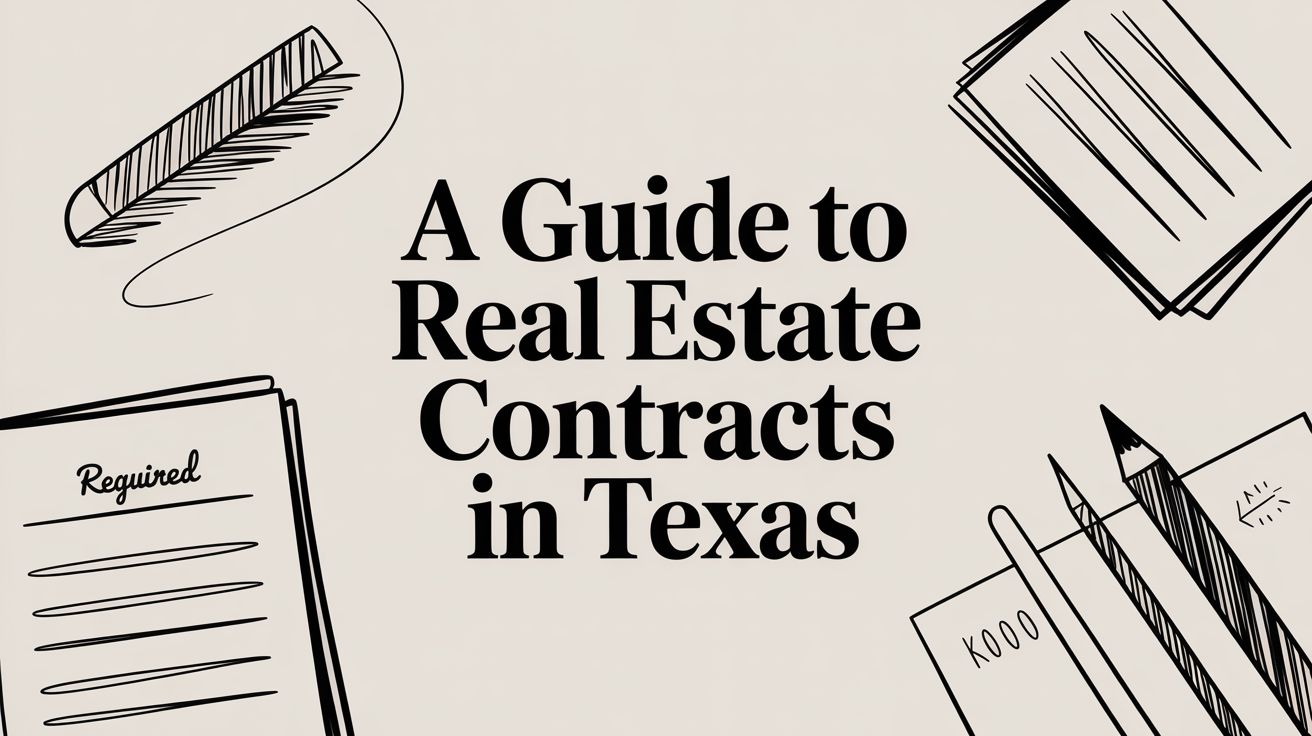
![Graphic design featuring the title "8 Valid Reasons to Break a Lease in Texas [2025 Guide]" with decorative elements like a pen and paper, emphasizing tenant rights and legal guidance in Texas.](https://texastenantlawyers.com/wp-content/uploads/2025/11/featured-image-7ebe2aec-eacb-4e61-8e85-9c298b07ad11.jpg)
